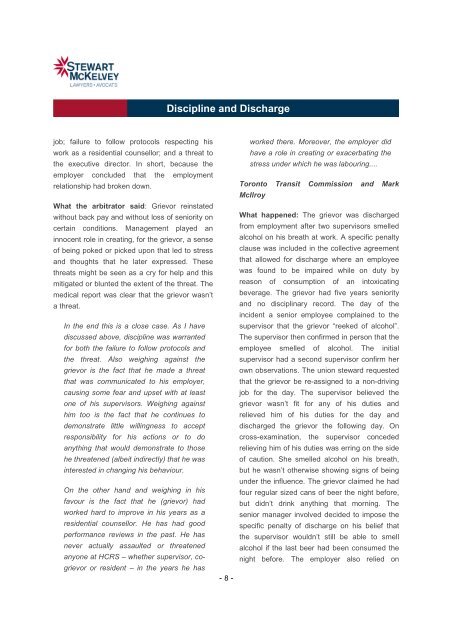Discipline and Discharge - Stewart McKelvey
Discipline and Discharge - Stewart McKelvey
Discipline and Discharge - Stewart McKelvey
You also want an ePaper? Increase the reach of your titles
YUMPU automatically turns print PDFs into web optimized ePapers that Google loves.
<strong>Discipline</strong> <strong>and</strong> <strong>Discharge</strong>job; failure to follow protocols respecting hiswork as a residential counsellor; <strong>and</strong> a threat tothe executive director. In short, because theemployer concluded that the employmentrelationship had broken down.What the arbitrator said: Grievor reinstatedwithout back pay <strong>and</strong> without loss of seniority oncertain conditions. Management played aninnocent role in creating, for the grievor, a senseof being poked or picked upon that led to stress<strong>and</strong> thoughts that he later expressed. Thesethreats might be seen as a cry for help <strong>and</strong> thismitigated or blunted the extent of the threat. Themedical report was clear that the grievor wasn’ta threat.In the end this is a close case. As I havediscussed above, discipline was warrantedfor both the failure to follow protocols <strong>and</strong>the threat. Also weighing against thegrievor is the fact that he made a threatthat was communicated to his employer,causing some fear <strong>and</strong> upset with at leastone of his supervisors. Weighing againsthim too is the fact that he continues todemonstrate little willingness to acceptresponsibility for his actions or to doanything that would demonstrate to thosehe threatened (albeit indirectly) that he wasinterested in changing his behaviour.On the other h<strong>and</strong> <strong>and</strong> weighing in hisfavour is the fact that he (grievor) hadworked hard to improve in his years as aresidential counsellor. He has had goodperformance reviews in the past. He hasnever actually assaulted or threatenedanyone at HCRS – whether supervisor, cogrievoror resident – in the years he hasworked there. Moreover, the employer didhave a role in creating or exacerbating thestress under which he was labouring....Toronto Transit Commission <strong>and</strong> MarkMcIlroyWhat happened: The grievor was dischargedfrom employment after two supervisors smelledalcohol on his breath at work. A specific penaltyclause was included in the collective agreementthat allowed for discharge where an employeewas found to be impaired while on duty byreason of consumption of an intoxicatingbeverage. The grievor had five years seniority<strong>and</strong> no disciplinary record. The day of theincident a senior employee complained to thesupervisor that the grievor “reeked of alcohol”.The supervisor then confirmed in person that theemployee smelled of alcohol. The initialsupervisor had a second supervisor confirm herown observations. The union steward requestedthat the grievor be re-assigned to a non-drivingjob for the day. The supervisor believed thegrievor wasn’t fit for any of his duties <strong>and</strong>relieved him of his duties for the day <strong>and</strong>discharged the grievor the following day. Oncross-examination, the supervisor concededrelieving him of his duties was erring on the sideof caution. She smelled alcohol on his breath,but he wasn’t otherwise showing signs of beingunder the influence. The grievor claimed he hadfour regular sized cans of beer the night before,but didn’t drink anything that morning. Thesenior manager involved decided to impose thespecific penalty of discharge on his belief thatthe supervisor wouldn’t still be able to smellalcohol if the last beer had been consumed thenight before. The employer also relied on- 8 -
















